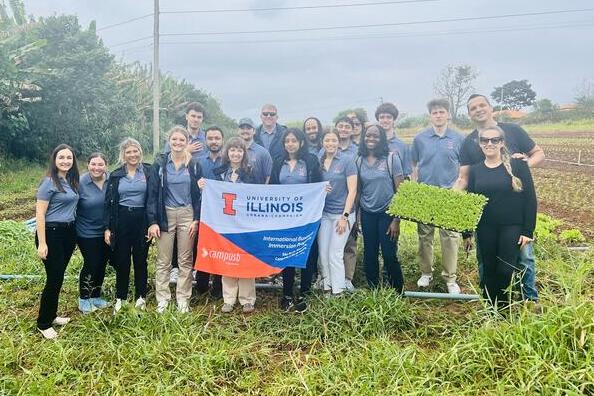Students immerse themselves in international business through Brazil study abroad program

A group of students from the University of Illinois Urbana-Champaign had the chance to immerse themselves in a new culture — and in the global agribusiness and food industry — during an 11-day study abroad program in Brazil.
Thirteen students in the International Business Immersion Program (ACE 436), housed within the Department of Agricultural and Consumer Economics, part of the College of Agricultural, Consumer and Environmental Sciences, left for São Paulo, Brazil, on May 13 and returned on May 25, with a new understanding of international business and cultural dynamics. Students in the IBIP course participated in the classroom portion of the program throughout the spring semester, followed by a study abroad program around the country.
Meredith Blumthal, who took over as the program’s faculty leader in the fall with her return to the Department of ACE, set up IBIP as a global classroom this semester. Students from Illinois collaborated with students from other universities around the world on group projects and case studies for eight weeks of the semester. One of these institutions was the University of São Paulo Escola Superior de Agricultura Luiz de Queiroz (ESALQ) in Piracicaba, a longtime partner of the College of ACES. While in Brazil, Illinois students visited the ESALQ campus and met their peers in person; together, they met their client company, IMBAgro, and toured the Ag Tech Innovation Hub.
“The global classroom really helped to ground the students doing business abroad while in the US. They had to navigate time zone issues and different ways that their teammates approached work,” said Blumthal, who is also the director of the Food and Agribusiness Management Program in ACE. “There’s nothing like peer to peer cross-cultural learning.”
While abroad, students had the opportunity to visit producers like Alecrim Orgánico, an organic produce farm that sells direct to the consumers who live in São Paulo, as well as Fazenda Tozan, a coffee farm in Campinas. Additionally, they visited the U.S. Consulate and met with the USDA’s Foreign Agricultural Services, where they heard about the U.S. perspective on Brazilian agriculture.
Their time in Brazil also consisted of several site visits to multinational agribusiness companies, including the Agricultura Digital at the Brazilian Agricultural Research Corporation (Embrapa), where they learned about advancements in production technologies in Brazil, policy and risk management, and open innovation. The group also spent time at GDM Seeds, a company that has offices in Illinois’ Research Park and controls 80% of the soybean genetics in South America.
“The opportunity to see Brazilian agriculture up-close and to learn about all that Brazil has to offer has been a tremendous learning experience for these students. They learned that doing business abroad requires you to also understand the people and organizations that you work with internationally, and that our American way of doing business is not necessarily the way the rest of the world works,” Blumthal said.
Chaya Sandler, academic advisor and experiential learning coordinator in ACE, co-taught the course and traveled with the group. Understanding the importance of experiential learning, she sees the value that programs like IBIP bring to students’ college education.
“Experiential learning is an opportunity for students to connect with industry leaders and producers to understand the skills and expertise which are indispensable to navigating their future careers,” Sandler said. “As a first-time co-leader of the program, I saw first-hand how participants were tasked with navigating cultural differences, and I am confident this experience will lead them to explore future intercultural opportunities, domestic or internationally, where they can utilize the skills they gained while abroad.”
The program ended in Rio de Janeiro where students had the opportunity to visit several major tourist sites, but also to learn more about the inequalities in Brazil. Visiting a community center, they met local residents who are passionate about improving their neighborhoods and observed a strong sense of community and resilience firsthand.
Students on the trip returned with hands-on lessons, new memories, and real-world experiences in the global food and agribusiness industry.
“This study abroad experience in Brazil was a transformative journey that exceeded my expectations,” shared Wajih Suqi, a rising senior studying agricultural economics. “Not only did it broaden my understanding of global business dynamics, but it also enriched my cultural intelligence, sparked personal growth, and gave me a new perspective on global diversity and social responsibility.”
Generous donors make the International Business Immersion Program possible. If you would like to give to the program, visit ace.illinois.edu/give. To learn more about the program, contact Meredith Blumthal.